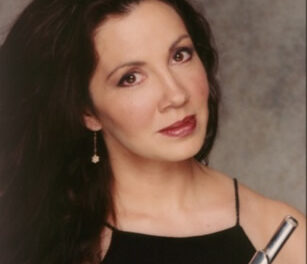There’s an art to creating programs, and Mary Lycan, who directs Women’s Voices Chorus, has the gift. It helps that she and other superior program makers – like NCSU’s Randolph Foy and Durham-based Rodney Wynkoop – aren’t locked into formulaic approaches that are market-driven or influenced by large committees…. On the evening of May 6, in University United Methodist Church, the 41 singers of WVC presented yet another unusual and immensely satisfying concert, based this time on the sea. It was titled “She Sells Sea Shells,” but it was more than the name implies, for the material ranged from creation – “…the spirit of God moved upon the face of the waters” – to “The Source of the Waters” (by Nancy Telfer) to a whole host of numbers related to the sea and sea-faring. Along the way there were pieces Karen A. Tarlow (“…let the sea roar…”), Barber’s somewhat strange “To Be Sung on the Water” (performed by WVC’s chamber choir, called The Spring Ensemble), Eva Uglade’s “Butterflies” (which “fly toward… the sea… leaving behind the ships…”), John Ireland’s “In Praise of Neptune,” and Samuel Taylor-Coleridge’s “From the Green Heart of the Waters.” And these were merely in the first section of the program! After two selections from Handel’s Water Music, played by last-minute fill-in accompanist Tom Bloom (subbing for Marie-Louise Catsalis, who dealt with waters of her own when her baby arrived earlier than expected), the evening’s “big number” ensued. ‘Twas The Sea Fairies, Op. 59, by Amy Marcy Cheney Beach, a truly remarkable cantata, featuring alto Mary Hoover (spouse of CVNC critic Ken Hoover) in a prominent solo role (along with sopranos Joan Troy and Virginia Byers Kraus), that seems far more advanced, musically, than its composition date – it was premiered in 1905 – would seem to suggest.
These are intermission-less programs – a challenge, perhaps, for some – but there’s always a little break for the musicians and the crowd; this time, the audience sing-along was “What Shall We Do with a Drunken Sailor,” which had cleaner lyrics than some versions we’ve heard (and sung…).
The rest of the concert involved somewhat lighter fare that dealt, variously, with other aspects of the sea and sailing – the dangers involved, loneliness (on the parts of seafarers and those they leave behind), certain gastronomic challenges, and the proclivities of some mariners to act up when they get back to shore. There were soloists from the ranks in several of these – Diane Wold, Anne Menkens, Claire Hermann, and Rhonda Matteson in Bill Lycan’s arrangement of Gary’s Mitchell’s touching “The Waterman”; and Sue Gidwitz, Susannah Hough, Kraus, Matteson, and Wold in Telfer’s arrangement of “I’se the B’y,” a Canadian folksong. The other works were Mendelssohn’s “I lean’d against the tow’ring mast” (“Waßerfahrt”), James Gordon’s hauntingly beautiful “Frobisher Bay,” and Stella terHart’s amusing “The Maid on the Shore” (sung by The Spring Ensemble). Joseph Gregorio’s arrangement of the suggestive “Roulez jeunes gens, roulez” rounded out the evening. Come to think of it, the works pretty much covered the waterfront – pardon the pun – with the exception of lady pirates; someone needs to come up with a song about Ann Bonny the next time.
It may be worth noting the large percentage of numbers composed or arranged by women, typical of Lycan’s innovative programming; the chorus’ motto is “Discovering the past… [&] Making history of our own.” Except for Beach (1867-1944), all the women composers represented are alive, kicking, and thus “contemporary.” It’s also worth noting that this is a superior vocal ensemble by any and all standards – these are mature, seasoned singers in the best senses of those adjectives, and they work together like a well-oiled machine (despite some challenges, including periodic battles with various bugs that, Lycan stated, had given them fits in the run-up to this program). The balance, blend, and precision noted during many other WVC events – and the reliable intonation, particularly in the many a cappella numbers – were in fairly constant evidence this time. Thus it was another noteworthy evening in which those present were richly rewarded with unusual music, beautifully presented. The printed program, annotated by Lycan and with texts and translations, was a class act as well. At the end, there were flowers for Lycan – and a cellophane-wrapped lighthouse(!) for Bloom! Folks who missed the concert – or those who want to re-live it – may order a CD of the entire thing by sending a check for $15 (plus $3 shipping) to WVC, PO Box 2854, Chapel Hill, NC 27515-2854. For more information on the choir, see http://www.womensvoiceschorus.org/.












